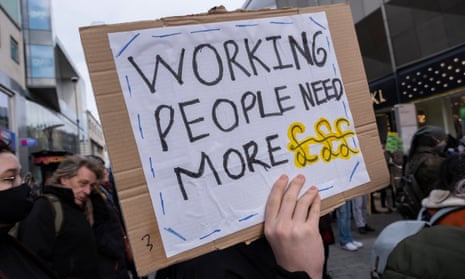A Conservative peer and ex-adviser to former welfare secretary Iain Duncan Smith has accused the government of treating the UK’s poverty crisis as a “political football” and lacking the will and ambition to tackle soaring hardship and destitution.
Philippa Stroud, who this week launches an independent cross-party commission aimed at finding practical solutions to poverty, said the pandemic and the cost of living crisis had showed long-term policy change was needed to transform the lives of millions of people struggling on low incomes.
Despite one in five UK citizens persistently living in poverty, she said the government had failed to come up with a genuine plan to get to grips with this, and neglected an increasingly impoverished benefit system that left rising numbers of people unable to stay afloat financially. “We can’t go on as we are,” she added.
Lady Stroud is to lead a high-powered poverty strategy commission, which aims to forge a political consensus around how to tackle poverty, and what the public should expect from a social security system, eschewing what it sees as a partisan approach that has sought to divide public attitudes to welfare for political gain.

“The lack of a political imperative has meant that too often these issues have been neglected and government responses have been reactive or ad hoc. The cost of living crisis means we are no longer afforded that luxury. It is the issue that will define the next election,” she said.
“We wait until there is a problem like on free school meals [or with energy prices] and we react to that,” she told the Guardian. “But the reality is that sitting underneath all of this is the fact that the poverty levels of this country are too high and the government doesn’t have a strategic approach to tackling poverty.”
Rising numbers of working people living below the breadline undermined the government’s assumption that any job was automatically a route out of hardship, she said, adding: “We need a much more honest conversation around levels of poverty in the UK – what’s really driving it and what the solutions actually are.”
The UK has lacked an overarching poverty strategy since the Conservatives dropped Labour’s plan to abolish child poverty after 2010. They proceeded to strip £37bn out of the welfare system over a decade of austerity. The latest figures showed 13 million people were in relative poverty in 2020-21, including just under 4 million children.
After years of growth, UK poverty rates fell during the pandemic, not least because of the temporary £20 a week uplift in universal credit benefit. The withdrawal of this boost last October, coupled with below inflation benefit rises in April, is expected to more than reverse this reduction in poverty.
The cost of living crisis has shed fresh light on poverty and the impact of welfare cuts. While poverty rates have fallen for pensioners in recent years, groups such as single parents have been disproportionately exposed to rising inflation, with an estimated 7 million people living in “financial fear” and going without food and heating.
Commission members include Tory MP and former welfare secretary Stephen Crabb and the Labour chair of the work and pensions select committee, Stephen Timms, as well as experts from business, charities and thinktanks. Paul Johnson, the respected director of the Institute for Fiscal Studies, is an adviser to the commission.
Crabb endorsed Stroud’s comments, saying the debate about poverty in the UK had been too often dominated by attempts to exploit crude divisions between “scrounger and strivers” for political gain. Tackling poverty, he said, should not be about “how we are going to get votes, it’s something that should challenge our consciences”.
An open letter signed by commission members said that, while poverty had reduced for some groups such as pensioners, UK poverty rates had remained stubbornly above 20% and the numbers of people in deep poverty had grown. “That has been the symptom of an approach that has used poverty as a political football.”
The commission builds on the work of the cross-party Social Metrics Commission, and is co-funded by the right of centre Legatum Institute – which is headed by Lady Stroud – and anti-poverty charity the Joseph Rowntree Foundation.
Stroud’s comments are striking given her role as policy adviser to Duncan Smith between 2010 and 2016, when billions were stripped from the welfare budget, and the Department for Work and Pensions oversaw the introduction of policies such as the two-child limit and the benefit cap, which have driven up poverty.
She has argued these cuts were imposed by the Treasury as the price of introducing universal credit in the face of internal opposition by her and colleagues – including former welfare minister Lord Freud, who recently called for the “vicious” two-child limit to be scrapped.
A government spokesperson said: “Absolute poverty has fallen by 600,000 people compared to 2019-20 and we know the best way to support people is to help them into work. We’re focused on exactly that, with unemployment close to its lowest rate since the 1970s and half a million people getting into work in the last five months.”
